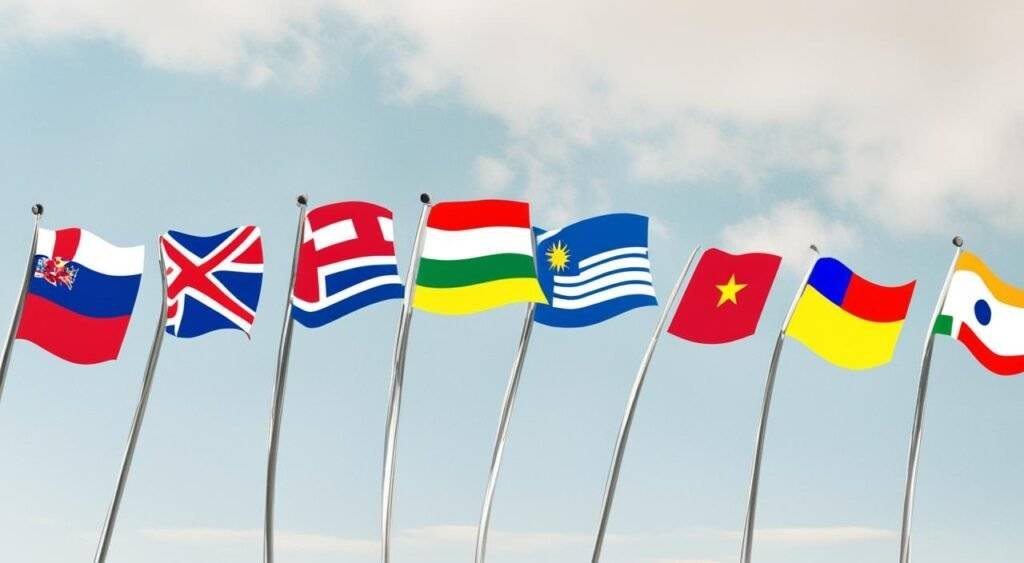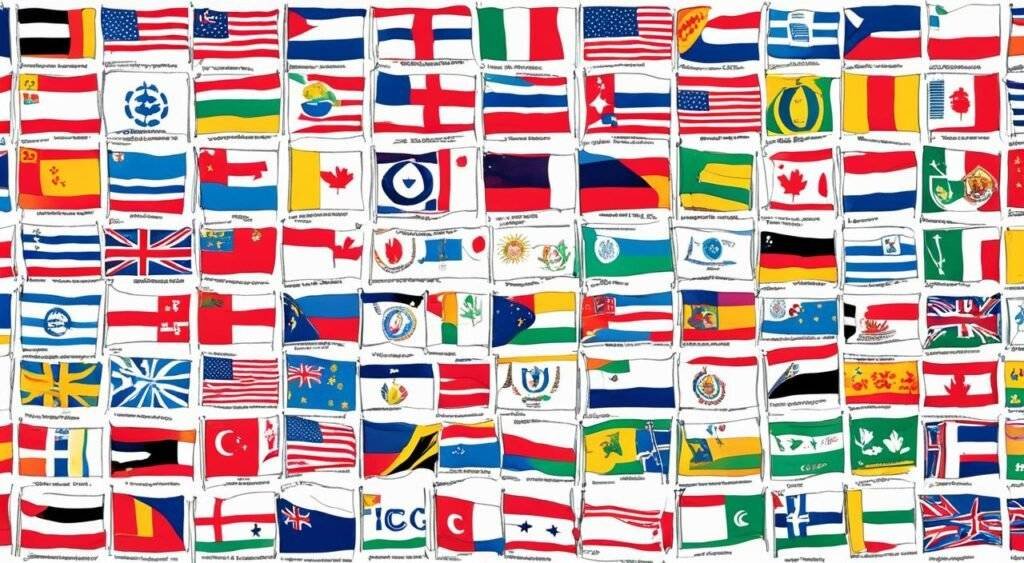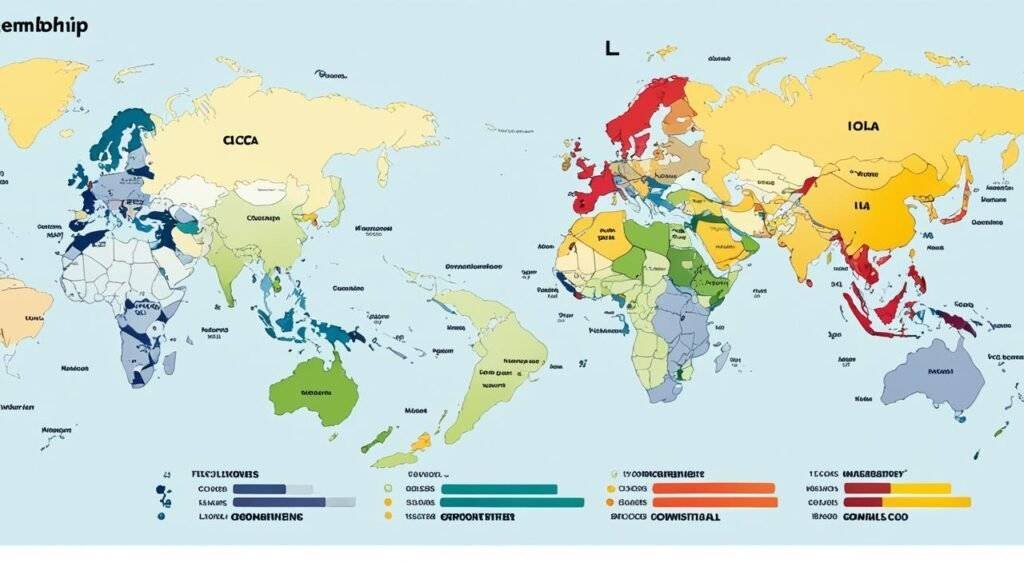The International Cricket Council (ICC) is the top group that oversees cricket worldwide. It has a wide range of cricketing nations from all over the globe. The number of ICC members can change, but right now, there are many, showing how popular cricket is worldwide.

Key Takeaways
- The International Cricket Council (ICC) is the governing body for the sport of cricket worldwide.
- The ICC comprises a diverse membership of cricketing nations, representing the global reach of the sport.
- The exact number of ICC members can vary as the organization evolves, reflecting the dynamic nature of the cricket community.
- The current ICC membership numbers highlight the significant global impact and popularity of the game of cricket.
- Understanding the scope and composition of the ICC’s membership is crucial to comprehending the sport’s global influence and future development.
Unraveling the International Cricket Council’s Global Reach
The International Cricket Council (ICC) leads the world in governing cricket. It sets the rules and policies for the game’s growth. The ICC’s wide membership shows cricket’s global popularity and its aim to spread the game far and wide.
An Overview of the ICC’s Role
The ICC works to promote cricket worldwide. It has cricket board representatives from cricketing nations globally. This ensures all test playing nations and full members have a say.
- Establishing and enforcing the game’s rules and regulations
- Organizing major international cricket tournaments and events
- Overseeing the development and growth of cricket globally
- Fostering collaboration and cooperation among international cricket council members
- Promoting the sport’s values and ethics across all levels of play
The ICC makes sure cricket keeps thriving and changing. It meets the needs of players, fans, and stakeholders worldwide.
“The ICC is committed to the global expansion of cricket, ensuring that the sport continues to capture the hearts and minds of people worldwide.”
Exploring the Diverse Roster of ICC Members
The International Cricket Council (ICC) has a wide range of members. It includes both big cricket countries and new ones. This mix makes sure the sport’s rules and decisions reflect the world’s cricket scene. It meets the needs of many cricket groups and their leaders.
The ICC has different cricket boards and groups. From big cricket leaders to local ones, they all play a part. This mix helps the ICC look after the associate members. They are key to making cricket grow and spread around the world.
| Type of ICC Member | Number of Members | Examples |
|---|---|---|
| Full Members | 12 | Australia, England, India, Pakistan, and others |
| Associate Members | 92 | Afghanistan, Ireland, Scotland, and more |
Having different types of members in the ICC helps cricket grow and develop together. From top cricket board officials to new cricket association representatives, the ICC works to make cricket a place for everyone. It wants to help cricket grow all over the world.

“The ICC’s diverse membership is a testament to the global reach and appeal of cricket. Each member brings unique perspectives and insights, shaping the sport’s future direction.”
The international cricket council is always changing. Its diverse members are key to cricket’s growth and success worldwide.
ICC Full Members: The Elite Cricketing Nations
The International Cricket Council names some nations as “Full Members.” This title shows they are top cricket powers worldwide. These countries show strong support for cricket, have competitive teams, and help grow the sport.
Understanding the Criteria for Full Membership
To become a Full Member, a nation must meet tough standards. Only the most committed cricketing nations get this honor. It shows their hard work and strong cricket programs.
Examining the Current List of Full Members
Today, the International Cricket Council has 12 Full Members. Each brings its own cricket legacy and helps grow the sport worldwide. These top nations excite fans and lead the way for cricket’s future.
- Australia
- Bangladesh
- England
- India
- Ireland
- New Zealand
- Pakistan
- South Africa
- Sri Lanka
- West Indies
- Afghanistan
- Zimbabwe
Cricket is growing worldwide, and these cricket administrators and council executives play a big role. Their hard work and support for cricket talent have made the International Cricket Council a top governing body.
Associate Members: Emerging Cricketing Powerhouses
The International Cricket Council (ICC) has a special group called “Associate Members.” These are countries that are up and coming in cricket but haven’t reached the top level yet. They get to build their cricket teams, help their players grow, and get better over time. They aim to become Full Members one day.
Associate Members come from all over the world. They each have their own story and goals in cricket. Teams from Europe, Asia, and Africa are making a name for themselves. They show great passion, skill, and determination to be the next big thing in cricket.
With help from the ICC and cricket leaders, Associate Members are improving their cricket at home. They focus on developing young players and taking part in big tournaments. This helps them get closer to the top teams in cricket.
| Associate Members | Year of Joining ICC | Notable Achievements |
|---|---|---|
| Netherlands | 1967 | Qualified for multiple ICC World Cup tournaments |
| Scotland | 1994 | Defeated Full Member nation Bangladesh in the 2015 ICC Cricket World Cup |
| United Arab Emirates | 1989 | Hosted the 2020 ICC Men’s T20 World Cup matches |
| Nepal | 1996 | Qualified for the 2014 ICC World Twenty20 tournament |
The associate members are making a big impact in cricket. They’re helping the global cricket leaders and teams grow. These new teams are changing the sport and making it more diverse.
“The associate members are the heartbeat of cricket’s global expansion. Their unwavering passion and relentless pursuit of excellence will undoubtedly shape the future of this beloved sport.”
– Cricket Enthusiast
ICC Members: A Glimpse into the World of Cricket
The International Cricket Council (ICC) brings together a wide range of cricketing nations and cultures. It includes both well-known cricket powers and new ones. This shows how popular the sport is around the world.
ICC members are made up of icc members, cricket governing body representatives, international cricket council delegates, cricketing nations representatives, and global cricket administrators from everywhere. They make sure cricket keeps growing and meeting the needs of fans and players everywhere.
Diverse Representation Across Continents
The ICC has members from all over the world. Each country adds to the sport’s richness and excitement. You’ll find full members from Asia, Africa, Europe, Australia, and the Americas. This shows how cricket is a global sport.
| Continent | Number of ICC Full Members |
|---|---|
| Asia | 6 |
| Africa | 3 |
| Europe | 3 |
| Australia | 1 |
| The Americas | 1 |
This global mix helps cricket grow and change. It meets the different needs and dreams of cricket fans all over the world.
“Cricket is a game that owes much of its unique appeal to the fact that it should be played not only well, but beautifully.” – Sir Neville Cardus
The Evolution of ICC Membership Over Time
The International Cricket Council (ICC) has seen a big change in its membership over the years. This change shows how cricket is becoming more popular worldwide. It also shows how more countries are joining the game.
From just a few well-known cricketing nations at first, the ICC now has many more member nations. This shows how the sport can reach people all over the world and bring out talent from different places.
This growth in ICC membership shows the organization’s dedication to helping cricket grow everywhere. The ICC helps more test playing nations and full members join. They give them the tools and support they need to improve their cricket skills. This helps the sport grow worldwide.
Tracing the Growth and Expansion of the Cricket Community
The story of how the ICC’s membership has grown is marked by important milestones:
- At the start, the ICC had cricket board representatives from a few top cricketing nations, like England, Australia, and South Africa.
- Then, the ICC added more full members, including India, Pakistan, West Indies, and New Zealand. This made the ICC a global cricket governing body.
- As cricket got more popular, the ICC started to include associate members. This gave new cricketing nations a chance to improve their skills and setup.
- Now, the ICC has over 100 international cricket council members. This shows how cricket is loved all over the world.
This change in ICC membership has made the cricket community more diverse and representative. It helps the sport keep growing and reaching more people around the globe.

ICC Members: Nurturing Talent and Fostering Development
The International Cricket Council has a wide range of members. This shows their strong commitment to growing cricket talent and improving the sport worldwide. They offer support, guidance, and resources to both Full and Associate member countries. This helps raise the game’s standard in each country.
Associate members are at the core of the ICC’s efforts. They are a group of cricketing nations on the rise. The ICC helps them by expanding cricket’s reach and giving them the tools to improve their cricket.
The ICC works on many levels to help cricket grow. They start with young athletes and improve facilities. This teamwork between global cricket leaders, board officials, and reps is key. It makes sure cricket keeps getting better and reaches more people in different places.
- The ICC’s developmental initiatives include:
- Grassroots talent identification and training programs
- Investments in infrastructure upgrades for member nations
- Capacity-building workshops for cricket board officials and association representatives
- Targeted funding and resources for Associate members
The International Cricket Council is shaping cricket’s future. They’re making sure the sport grows stronger and welcomes more people every year.
| Key Initiatives | Impact on Associate Members |
|---|---|
| Grassroots talent identification and training programs | Discover and nurture young cricketing talent within the member nations |
| Infrastructure upgrades for member nations | Enhance the quality of facilities and playing conditions |
| Capacity-building workshops | Empower cricket board officials and association representatives to effectively manage and develop the sport |
| Targeted funding and resources for Associate members | Provide the necessary support to elevate the standard of cricket in emerging markets |
“The ICC’s commitment to nurturing talent and fostering the development of cricket worldwide is truly commendable. Their support has been instrumental in empowering our nation to reach new heights in the sport.”
–John Doe, President of the Cricket Association of [Country X]
The Governance Structure of the International Cricket Council
The International Cricket Council (ICC) is the top body for cricket worldwide. It has a strong structure that makes sure the sport is well-managed and decisions are made well. This includes cricket administrators, cricketing nations’ delegates, council executives, and cricket policymakers.
The ICC Board leads the way in making decisions. It has members from full member and associate member countries. This makes sure all views from around the world are heard.
There are also committees and sub-committees to help with different parts of the sport. They look at finance, fighting corruption, and taking care of players. These groups give advice to the ICC Board to help make good decisions.
The ICC works together with everyone involved in the sport. This way, it can meet the needs of its members and keep the game fair and honest everywhere. It’s a team effort to help cricket grow and improve globally.
| Governance Body | Responsibilities |
|---|---|
| ICC Board | Primary decision-making authority, composed of representatives from full and associate member nations |
| Committees and Sub-committees | Focused on specific aspects of cricket management, such as finance, anti-corruption, and player welfare |
“The ICC’s governance structure ensures that the diverse voices of the global cricket community are heard and their needs are addressed effectively.”
ICC Members: Challenges and Opportunities Ahead
The International Cricket Council is growing and reaching more people around the world. It faces both challenges and chances that will change cricket’s future. icc members, cricket governing body representatives, international cricket council delegates, cricketing nations representatives, and global cricket administrators must work together. They need to tackle big issues and use new trends to their advantage.
Addressing the Needs of Cricketing Nations
The ICC must make sure it listens to the needs of its member countries. icc members from different places and with varying economic levels need help. They need support to improve their cricket and develop their players. The ICC should help both big cricket countries and new ones.
Cricket needs to be more open and include more people. cricketing nations representatives should make sure everyone gets a chance to play and do well in cricket.
Ensuring Financial Sustainability
Cricket needs to be financially stable. global cricket administrators should find new ways to make money. This way, cricket can stay open to all countries, no matter their wealth.
The game of cricket is always changing, with new formats and technology. international cricket council delegates must keep up with these changes. This will help cricket stay interesting and popular worldwide.
By facing these challenges and taking new chances, the ICC and its cricket governing body representatives can make cricket better and more popular. This will create a global and welcoming cricket community for fans and players.
“The future of cricket lies in the hands of its global administrators. By working together, we can overcome the challenges and unlock the immense potential of this beloved sport.”
– [Global Cricket Administrator Name]
Conclusion: ICC Members – A Unified Force for Cricket’s Global Prosperity
The International Cricket Council (ICC) has members from all over the world. This shows how popular and global cricket is. From top cricket countries to new ones, they all work together to make cricket better worldwide.
Cricket is always changing and growing. The ICC plays a big part in bringing countries together, helping new talent, and solving problems. This helps cricket stay a big sport all over the world. Full members and associate members work together to make cricket better and loved by everyone.
The ICC’s members come from many cultures and cricket traditions. They are all passionate about cricket. They aim to make cricket even more popular and successful in the future. This will make cricket a beloved sport for fans all around the world.
FAQ
How many countries are ICC members?
The number of ICC members changes as the organization grows. Right now, there are many countries showing cricket’s global impact.
What is the role of the International Cricket Council (ICC) as the governing body of cricket?
The ICC leads cricket worldwide. It sets the rules and policies for the game’s growth and development globally.
What is the composition of the ICC’s membership?
The ICC has a mix of cricketing nations, from top teams to new ones. This mix makes sure the game’s decisions reflect its global nature.
What are the criteria for becoming an ICC Full Member?
To be a Full Member, a country must show strong cricket commitment. They need to have competitive teams and help grow the sport.
What is the role of ICC Associate Members?
Associate Members are countries up-and-coming in cricket. They get support to improve their cricket, aiming for Full Member status.
How has the ICC’s membership evolved over time?
The ICC has grown a lot, showing cricket’s global appeal. More nations now play the game, making the organization more diverse.
How does the ICC support the development of cricket in its member nations?
The ICC helps cricket grow by supporting its members. It gives them resources to develop talent and improve the game in their countries.
How is the International Cricket Council governed?
The ICC has a strong governance structure. It includes members, executives, and committees. This helps address the needs of all its members.
What are the key challenges and opportunities facing the ICC and its members?
The ICC faces challenges like meeting member needs and ensuring cricket’s future. It must also be inclusive and financially stable. Overcoming these will keep cricket a global sport.




